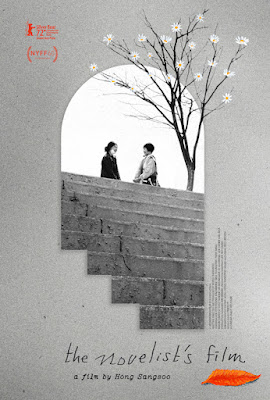Hong Sang-soo’s films with French actress Isabelle Huppert have all arisen out of chance meetings and commenced without finished scripts. For their latest film, it really shows. Hong’s films are always lightweight, but this one could blow away with a gentle breeze. The film follows a French tutor, who like the director, somehow gets away with never preparing for her students in Hong’s A Traveler’s Needs, which just opened in additional cities.
Iris supposedly teaches French by prodding her students to rcall their deepest emotional memories and then translating them into French and recording them on audio cassettes for them to listen to. This way, their lessons will resonate for them, unlike that rote Dick-and-Jane stuff.
Okay, maybe. Not all of her clients are convinced, but her loyal student Isong buys in. She obediently discusses the thoughts that went through her head while playing piano (during which time, Iris boorishly steps outside for a smoke). Then, she refers her tutor to a married couple she knows.
Wonju clearly suspects Iris is a lazy scammer, but her husband Haesoon is impressed by her ability drink makgeolli without any signs of inebriation. Eventually, Wonju plays guitar, prompting a conversation almost identical to the one Iris had with Isong, which constitutes the film’s clearest manifestation of Hong’s regular doubling or repeating motif.
Then Iris returns home to spend time with her much younger roommate-slash-ambiguous boyfriend, Inguk, until his mother (who is about her age) pops in unexpectedly. Then, she is off like a rocket, leaving him to mother’s third-degree.
Honestly, Traveler’s Needs must be Hong’s dullest film to-date, which is saying something. Even by his generous standards, it is aimless in direction and decidedly sleight. Even Huppert, his buddy at Cannes, appears to struggle with her halting, minimalist dialogue. Hong’s regular player, Kwon Hae-hyo, just falls back on tried-and-true Hong-isms, mostly by drinking like a fish. There is simply no meat on his bony screenplay for them to sink their teeth into. Only Cho Yunhee successfully gets into any sort of rhythm as Inguk’s mom, who really is quite a formidable interrogator.




























